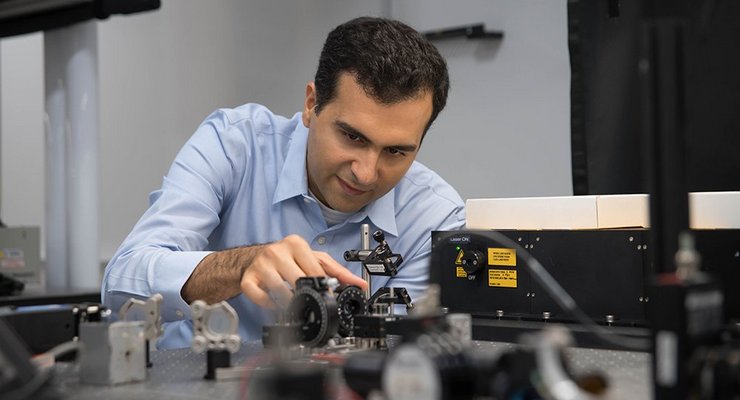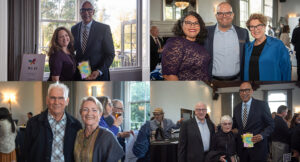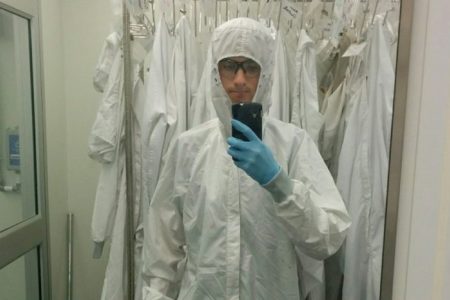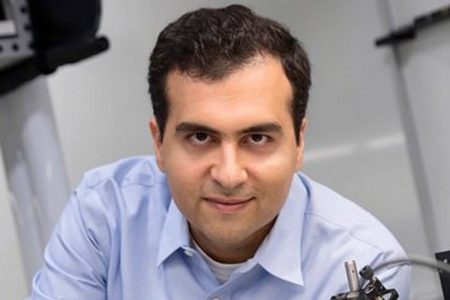
Aliraza Marandi
Alireza Marandi, Caltech assistant professor of electrical engineering and applied physics, continues the 2020–2021 Watson Lecture season at 5 p.m. Wednesday, Nov. 11 by explaining how science can provide medical and financial opportunities by uncovering the building blocks of diseases through the power of light.
Titled “The Power of Nonlinearities: Unlocking Opportunities for Sensing and Computing with Light,” Marandi’s lecture will describe how he and his research group are exploring scientific frontiers in nonlinear photonics, and how their work could enable a broad range of previously less-explored applications for lasers and light detectors.
The daunting subject matter sounds like enough new and potentially mind-blowing information to twist an ordinary brain into more of a pretzel than it already is. But don’t worry. If you are an entrepreneur, remember these three words: breath analysis devices.
“There is a correlation between the molecular composition of your exhaled breath and what exists in the blood,” explains Marandi, who earned his Ph.D. from Stanford University in 2013. Before coming to Caltech, he held positions as a postdoctoral scholar and a research engineer at Stanford, a visiting scientist at the National Institute of Informatics in Japan, and a senior engineer in the Advanced Technology Group of Dolby Laboratories.
“There’s a lot of useful information about your health contained in your breath,” Marandi continues, “but it is difficult to analyze because the concentrations are so low.”
If foul odor isn’t enough of an indicator of ill health, another straightforward way to find out just what life-threatening molecules lurk in a person’s bad breath could be to build a spectrometer, Marandi postulates. This is a measuring tool that researchers can look at and determine which frequencies of light are absorbed as the beam passes through matter.
The problem is a perfect spectrometer would add weight and unnecessary complexity, and could be problematic to downsize into a device compact enough for at-home use.
“I don’t have to spend a lot of time making a full-fledged spectrometer; I just need to make a device from which I can extract the right information,” says a confident Marandi, sounding like a modern-day Tesla, or Edison.
Currently, Marandi, a senior member of the Optical Society (OSA) and the Institute of Electrical and Electronics Engineers (IEEE), is developing a sensor that works in the mid-infrared range that can respond to and distinguish large numbers of molecules simultaneously.
If developed, such a device could be more accurate than a good spectrometer; it could also be smaller and more efficient, allowing it to be scaled down for consumer use.
The only thing is, using more commercially available compact and inexpensive lasers presents a sensing challenge: they work best in the visible, or near-infrared parts of the spectrum, where the molecular information is not as easily accessible.
Marandi starts with these tools and uses nonlinear photonics to transform his beam into the mid-infrared range where it is most appropriate for molecular sensing.
“You actually want to think about not having a very clean set of information but being able to get enough bits and pieces,” says Marandi, recipient of a National Science Foundation CAREER Program award, the Air Force Young Investigator Program award, and the Young Scientist Prize of the International Union of Pure and Applied Physics. In 2019 he was named the KNI–Wheatley Scholar in Nanoscience at the Kavli Nanoscience Institute.
In other words, Marandi’s solution is imperfect is sometimes better, or, as the press release announcing the lecture put it, “When the Perfect is the Enemy of the Good.”
Named for the late Caltech Prof. Earnest C. Watson, who founded the series in 1922, the Watson Lectures present Caltech and JPL researchers who eagerly describe their vital work to the public.
Marandi’s lecture is the second of eight for the 2020–21 season, which runs monthly through May.
“Historically, the Watson Lectures were presented on our Pasadena campus to a local audience,” says Michael Alexander, director of public programming, which presents the Watson Lectures.
“The virtual format creates a rare opportunity for anyone interested in Caltech’s cutting-edge research to take a deep dive with Caltech researchers,” Alexander says. “These lectures are a fascinating way to learn about the innovative tools and out-of-the-box thinking our faculty use to address critical issues facing our society.”
If any of the above seems interesting, this online event is free and open to the public. The lecture begins at 5 p.m. and runs approximately 40 minutes. It will be followed by a live audience Q&A with Marandi.
Advance registration is required, as capacity is limited. The lecture can also be viewed (without the Q&A) on demand starting at 8 p.m. that same evening on Caltech’s YouTube channel.
If there are any questions, contact the Caltech Ticket Office via email at events@caltech.edu or leave a message at (626) 395-4652. Please allow 48 hours for a response. On Nov. 11 only, the Caltech Ticket Office phone line will be staffed remotely from 3 p.m. to 5:15 p.m. to provide technical support to Zoom webinar participants and to answer questions about the event.
For more on the Watson Lecture Series, visit http://events.caltech.edu/





